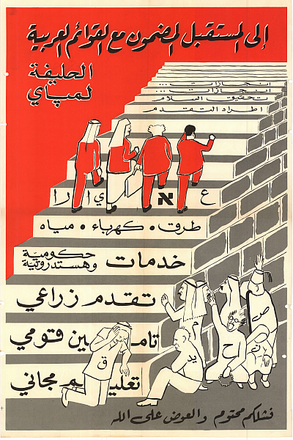Top Qs
Timeline
Chat
Perspective
Arab satellite lists
Israeli Arab party voting lists From Wikipedia, the free encyclopedia
Remove ads
The Arab satellite lists (Hebrew: מפלגות הלוויין הערביות)[1], Arab lists (Arabic: القوائم العربية) Minority list[2] were Israeli Arab satellite parties formed for the purposes of electoral support of Mapai (and later the Labor Party), and other Zionist parties between 1948 and the mid-1970s.[3][4][5][6] Between the 1949 elections and the 1969 elections, most of the Israeli Arab vote was divided between the communist parties Maki and Rakah[a] and the Arab satellite lists.[4] The time span under military rule (1948–1966) was described as the "golden age" of satellite parties.[1] According to Israeli scholar Rebecca Kook, Maki and Rakah were considered the only parties to truly represent Arab interests until the Progressive List for Peace won two seats in the 1984 elections.[4]

The existence of the Arab lists was partially because Arabs were barred from membership of Mapai until 1973.[7] Unlike normal political parties, they were not active between elections.[8] Most of the lists survived more than one term, and all were subservient to the policies of their patron Mapai.[5] The lists were put together based on local influence, clans and religion;[9] and consisted of local politicians and clan leaders.[10]
According to Ilana Kaufman, the Arab lists; "were not proper parties but ad hoc electoral arrangements for the election of Arabs to the Knesset."[11] Majid Al Haj writes that the object of the lists "was not the political mobilization of the Arab populations but rather the capture of Arab votes."[12]
The Labor Party withdrew its support from its last satellite list, the United Arab List, prior to the 1981 elections. The Alignment, an alliance of the Labor Party and Mapam, saw its share of the Arab vote triple in the elections,[13] whilst the UAL failed to cross the electoral threshold. Alongside the defeat of two other lists, the Christian-led Arab Brotherhood List and the more radical Bedouin-led Arab Citizens' List[14] the election was seen of the end of personalist Arab lists based on traditional leadership.[15][16] The Arab Democratic Party, established in 1988 as a breakaway from the Labor Party, effectively took their place in the political sphere[17] but they took a more critical stance towards the Zionist parties compared to the satellite parties.[10][18][19]
Remove ads
List of Arab satellite lists
Summarize
Perspective
Usually, these lists signed vote-sharing agreements either with their patron or one another but the Independent Faction for Israeli Arabs and Progress and Work in 1959,[22] Cooperation and Brotherhood in 1973,[23] and all lists in 1951[24] and in 1981 have not sign an agreement.[25]
Before the 1981 election, the Zionist parties like Alignment dropped their support the satellite lists and none of them crossed the threshold.[26] Arab Brotherhood List led by Haneh Hadad and Arab Citizens' List led by Nuri el-Okbi had previous ties to HaAvoda[27] but el-Okbi ran a radical campaign to attract non-Bedouin Arabs and neither were sanctioned by them. Hadad later joined Alignment.[28]
Remove ads
Elections
This graph was using the legacy Graph extension, which is no longer supported. It needs to be converted to the new Chart extension. |
election results of satellite lists and other Arab-led parties
The table below shows the votes of Arab-Israelis for Arab-led political parties, Jewish-led political parties and the satellite lists:[29]
Remove ads
References
Wikiwand - on
Seamless Wikipedia browsing. On steroids.
Remove ads
